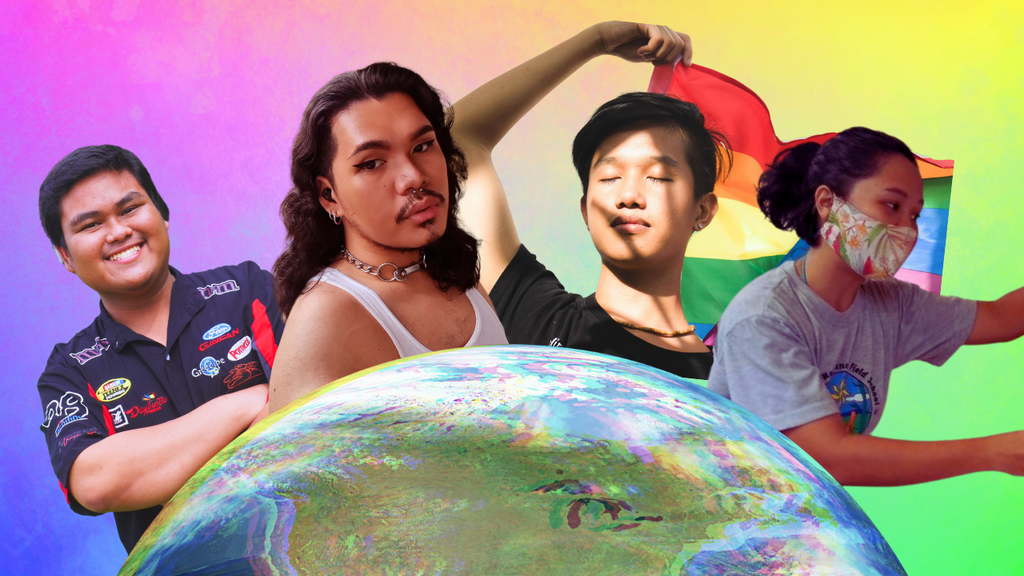
Climate change is an issue that pierces through different sectors and classes. Calls for climate justice remind us that climate impacts disproportionately affect historically marginalized groups, including the LGBT community, who bear the brunt of the consequences of climate inaction.
But even in the face of discrimination, Filipino queer individuals are also the ones taking action and leading the fight against various forms of injustices, including those that gravely affect the environment.
We interviewed four queer eco-warriors from different parts of the Philippines about the state of our climate and how it connects with Filipino queer realities, and how we, as a society, can learn from their efforts in transcending the movement.
—
JOSHUA VILLALOBOS
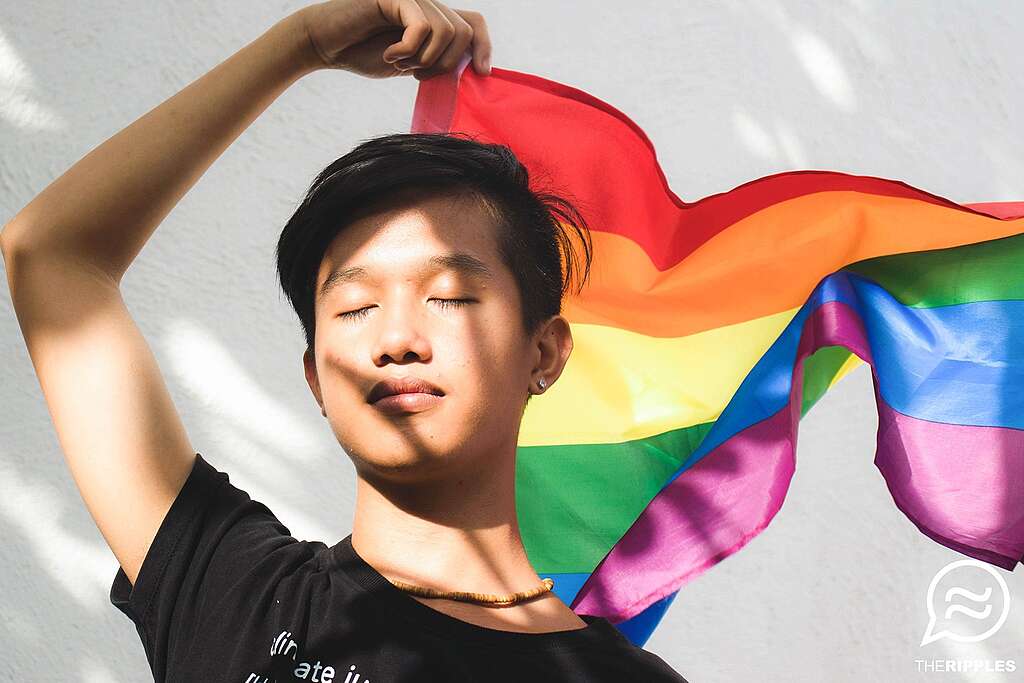
Joshua is a young queer climate activist from the Negros Island. As a queer living in the Philippines, a country that’s always ranked the highest on climate vulnerability, Joshua knows for a fact that the majority of the Filipinos have been survivors of climate-induced disasters. He has experienced constant flooding in their community since he was six.
Typhoon Haiyan remains the most traumatic climate disaster for Joshua. As he remembers vividly, it was a heart-wrenching moment to see his family watch their house get destroyed by one of the strongest typhoons in recent history.
Joshua puts emphasis on the fact that in many climate-induced disasters and calamities, women, LGBTQIA+, and other gender minorities and vulnerable groups face another layer of marginalization. As people who are already discriminated against and marginalized in this society, climate change exacerbates the difficulties and challenges the community faces.
In terms of involvement, Joshua says that despite having myriads of queer people on the frontline fighting against the climate crisis, their contributions are often unrecognized and unseen. Nevertheless, as part of and together with the community, Joshua continues to work in many aspects of climate and social justice to bring about social transformation that puts all gender, and all marginalized people and vulnerable sectors at the center of social development.
Talking about the call for climate justice is queer justice, Joshua highlights the significance of intersectionality as the queer community recognizes that various forms of oppression, such as racism, sexism, ableism, and classism, intersect and compound the challenges faced by marginalized communities.
As the queer community continues to face tremendous adversity throughout history, including discrimination, violence, and marginalization, Joshua believes that persistence and perseverance are imperative in the queer movement. For instance, the campaign to pass the SOGIE Equality Bill has been going on for two decades already and it is still being debated nowadays. However, despite these obstacles, the movement has been persistent in its pursuit of equality and justice.
Similarly, the climate justice movement encounters numerous barriers and resistance from powerful interests. By observing the unwavering determination of the queer community, we can find inspiration to overcome challenges and keep pushing for transformative change.
“A planet that I’m proud of is one that values justice over convenience and people over profit.”
Joshua is one of the founding convenors of the coalition Youth for Climate Hope, and was awarded the Negros Occidental Conservation Achievement Award (2022) and the Negros Young Heroes Award (2023) for his effort on climate action and education. Currently, he sits on the Board of three youth organizations tackling climate change, youth empowerment, and farmers’ rights.
LESTER DELLOSA
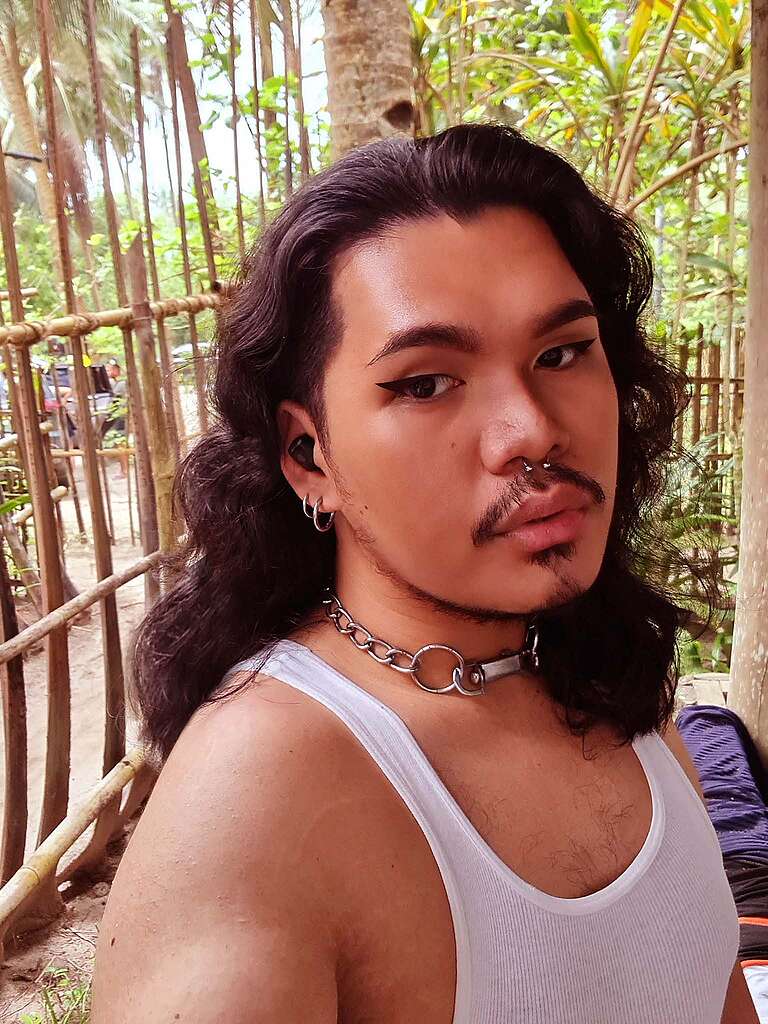
Lester is an artist-designer and artivist who uses art to communicate about climate change to a broader audience. Based in Legazpi, Bicol, Lester describes their hometown as a gateway to a variety of climate-induced disasters. Bicol is both an agricultural and coastal region, therefore, susceptible to the impacts of both flooding and droughts.
While these disasters do not choose their victims, Lester points out that queer individuals experience the aftermath in ways that further push the community to the margins. For Lester, the queer community tends to be rendered invisible by disaster response efforts. Relief packs distributed in evacuation centers may lack necessary products because agencies overlook the needs of individuals based on their SOGIESC. With transgenders’ needs not taken as seriously as it needs to be in local communities, disaster responses overlook their physiological needs such as menstrual hygiene products for some transgender men and transmasculine individuals who may still be in need of those.
Nevertheless, it is important to understand that queer individuals are not mere victims, but heroes with the capacity to accelerate movements with their own unique resourcefulness and wit. For Lester, art is a vital platform to spread awareness about environmental protection through emotion. Lester’s very own “Sirena sa Sayong” is an example of a well-engaged project that uses creativity to forward an important message on single-use plastic, ocean wastes, and sustainable fashion. Focusing on an odd scenario with a mermaid at the center of the storytelling, “Sirena sa Sayong” employs bits of wonder and fantasy to tug on the viewer’s humanity and compassion toward the advocacy. Its success enabled their team to reach platforms outside of the Bicol region, while engaging other organizations and institutions.
Lester believes that in accelerating movements, words can only say so much. Feelings, on the other hand, allow one to tap into a human connection that pierces through language and cultural barriers, where all people are able to live in an equitable society.
“A planet I am proud of is one that has an emotional connection with nature without judgment of who and what you are. It is a planet that feels together.”
Lester is the Creative Director at CICCADA, a Filipino brand movement that champions sustainability and collective climate action through fashion and design. Know more about their advocacy on CICCADA’s Facebook page.
FIDEL PASCO JR.
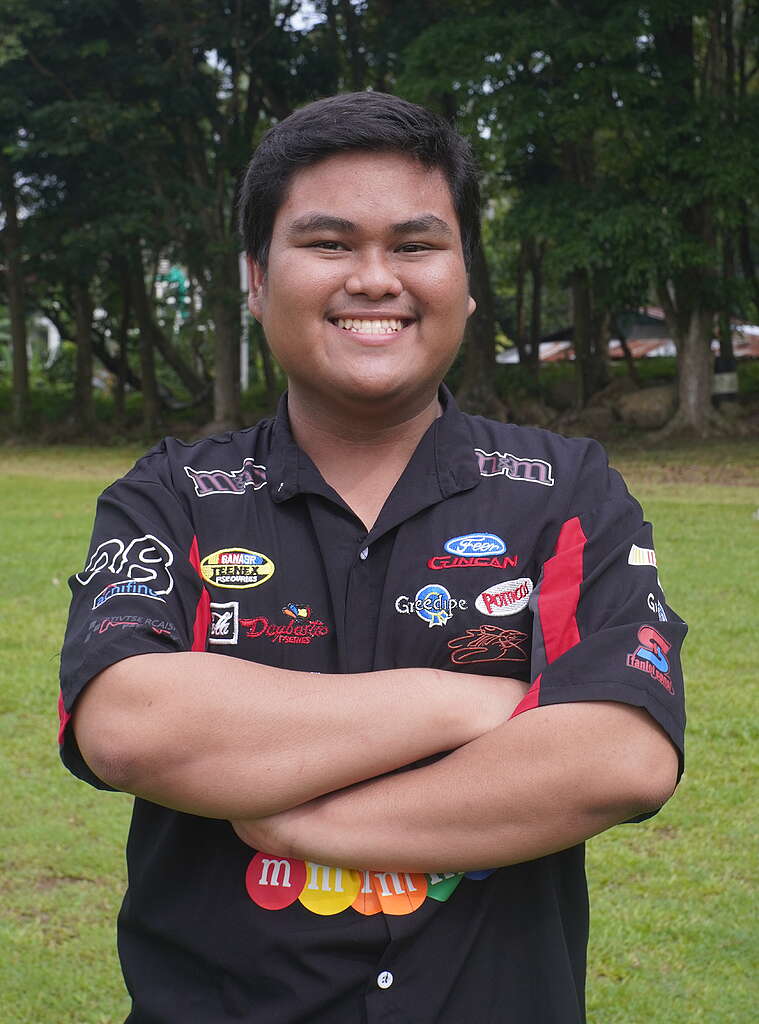
As the incumbent President of the Pag-asa Youth Association of the Philippines – Mintal Chapter, Fidel has been mobilizing the youth and understanding the realities of marginalized sectors, including the LGBTQIA+ community, during climate-induced disasters.
Despite knowing that climate situations do not discriminate on the basis of social attributes such as gender and sexuality, Fidel recognizes that queer individuals experience layer upon layer of struggles as they experience frequent assaults, harassment, and prejudice alongside the actual effects of climate emergencies. He believes that until inclusive policies and legislations are not institutionalized, there will always be queer exclusion from disaster preparedness, management, and recovery. “As queer people, we frequently have to negotiate a system that is fundamentally biased and that places a high priority on heteronormative attitudes and norms,” he said.
Fidel joined campaigns and wide-scale petition signings for climate justice movements such as the #NoToDavaoWTE which is geared towards the cancellation of all waste-to-energy (WTE) incineration projects in Davao. Furthermore, he also contributes to the Zero-Waste campaign of Barangay Mintal in Davao City by conducting workshops and educational campaigns.
Although these efforts are in place, Fidel still hopes that there will be acknowledgement of the intersection between queer justice and climate justice by uniting various groups to aim for mutual goals. “Our collective freedom is inevitably linked to ensuring a livable and sustainable community,” he said. “Many goals of climate justice align with those of the hopes and works of queer activists, which are to foster a safer and better place where everyone can co-exist with the environment.”
“A planet that I am proud of is one that encourages sustainable, adaptable, and transformative communities that defend all human rights while living in peace with the environment.”
Fidel is a Communication and Media Arts student from UP Mindanao and an alumnus of the Philippine Youth Leadership Program Batch 17/18 in Illinois, USA. He is also the incumbent President of the Pag-asa Youth Association of the Philippines-Mintal Chapter and Youth Sectoral Representative of the BESWMC of Barangay Mintal.
DREI CASTILLO
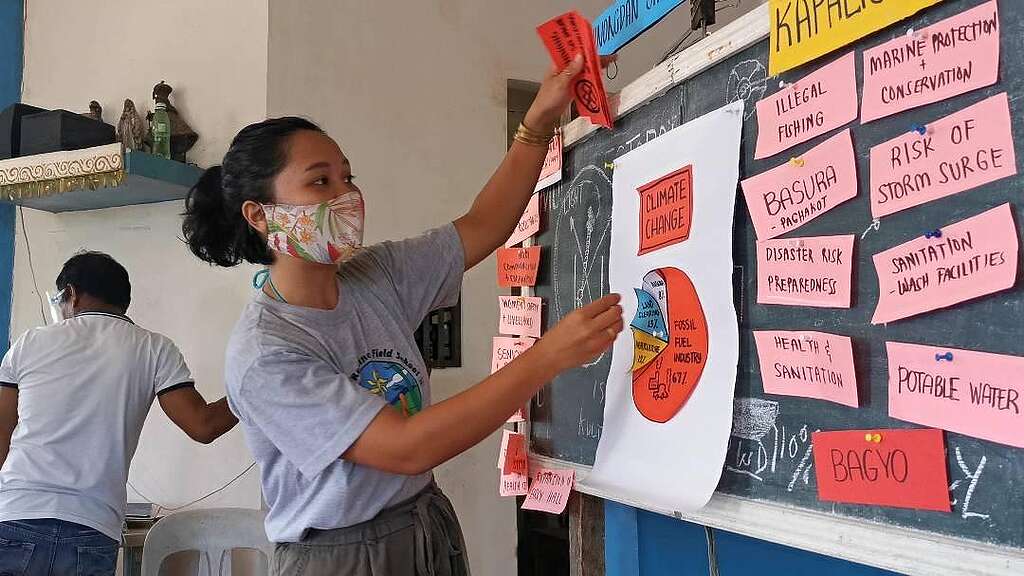
Drei is a Greenpeace volunteer who happily left city-living for the mountains and seas of Northern Samar. In discussing the movement towards climate and queer justice, she believes that environmental justice is social justice – and queer movement as a strong and active community fighting for the rights of vulnerable sectors.
While she acknowledges her own privileges have shielded her from directly experiencing severe climate impacts, Drei brings forth that at the core of these experiences is the understanding that disasters do not discriminate, responses do. And in terms of measures during response operations to disaster events, the challenges queer individuals are forced to confront are significantly different as these operations rarely consider gender, much less SOGIESC.
Beyond the alarming news of increasing carbon emissions and other similar abstractions, there is the concrete history of marginalization that shapes the landscape of the contemporary queer experience. Increasingly devastating climate impacts further saturate this landscape with modern iterations of enduring injustices.
“A planet I’m proud of is one that views issues and solutions with holistic lenses. To fight for justice is to understand that the essence of the movement is toward defending the dignity and humanity of our most vulnerable sectors.”
Drei and her partner, Rona, founded together Sarayo Forests, a local community-based organization that asks, “how might we add value to creating healthy ecosystems for communities directly affected by its degradation?” Currently, they are working on a bicycle mobility project called “Pedal Palapag,” for the benefit of underprivileged high school students of Palapag, Northern Samar.
—
Pride is a protest. Behind the flags, cheers, and chants, there is the call for collective action towards an equitable planet. The experiences of Joshua, Lester, Fidel, and Drei show how other social and environmental factors affect the queer community. It challenges us to transcend with the movement and not to shy away from unfamiliar avenues and platforms in communicating our messages to the greater community. It reminds us that justice, in its truest sense, is all-encompassing.
As we close this year’s Pride Month, we are invited to join our eco-warriors in their call: Climate Justice is Queer Justice!
###
Kuhlyn Salazar, Karen del Rosario, and Job Collantes are interns of Greenpeace Philippines. Kuhlyn is an international relations student from Ateneo de Manila University, while Karen and Job are development studies students from De La Salle University Manila.
